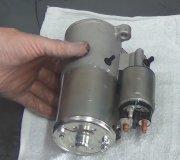1994 Chevy Van Two Wheel Drive Automatic 211000 miles
I've had this chevy van sitting out in the cold for 8 months. Before that, the van was driven on and off, though it appeared to be leaking some fluids of some kind.
The battery is one year old, and seems to be fully charged (I boosted and had a charger on it overnight).
When I put the key in the ignition and turn it I hear clicking that sounds to me like like it is trying to start. However, it doesn't try to turn over. My thought at this point is that the plugs are firing, but there is something wrong with the starter.
When I head over to the engine compartment and open it, I can hear a whirring from the left hand side (where there is a big component connected with a red line that looks like a molex connector of some kind, and a black line that is magnetized and pressed up against the component - it is not fitted into any kind of connector, just magnetized).
My thoughts on reading from the web is that this component is the starter, and that the electric starter engine is going (e.G. The whirring).
I'm at a loss now - any help would be appreciated!
Chris
Sunday, December 28th, 2008 AT 12:30 AM



